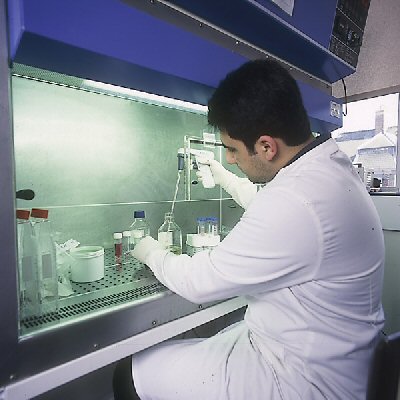
Leicester Medical School
Department of Cancer Studies and Molecular
Medicine
School of Medicine >> Department of Cancer Studies and Molecular Medicine >> MSc in Mol Path/Tox
 |
|||||
Leicester Medical School
|
|||||
|
School of Medicine >> Department of Cancer Studies and Molecular Medicine >> MSc in Mol Path/Tox |
|||||
|
MSc in Molecular Pathology and Toxicology |
|||||||||||||||||||||||||||||||||||
 COURSE AIMSThis is a 12 month full-time, or 2-3 year part-time course starting in September, designed to provide detailed training in the theory and practical techniques of molecular pathology and toxicology with emphasis on understanding of molecular mechanisms in cancer and chemoprevention. A 6 month laboratory project placement in industry or a research laboratory in the University is an integral part of the course. The course is designed to give relevant knowledge and skills to students and the close involvement of the Department with industry and the NHS ensures the continued suitability of this course for future employment in the pharmaceutical, biotechnology, health care and environmental control industry, as well as in academic research. COURSE BACKGROUNDThe course is based in the School of Medicine, University of Leicester, is taught by Department of Cancer Studies and Molecular Medicine in the Adrian Building on the Main Campus and at The Robert Kilpatrick Clinical Sciences Building, Leicester Royal Infirmary. This MSc. forms part of a wider academic programme of taught postgraduate courses related to, and integrated with, the core scientific research expertise in the Faculty of Medicine and Biological Sciences. The Department of Cancer Studies and Molecular Medicine has a well-established reputation and includes research groups in haemato-oncology, breast cancer, chemoprevention, radiobiology and oxidative stress, reproductive sciences, and forensic pathology. The Medical Research Council Centre for Mechanisms of Human Toxicity is also established at University of Leicester and some of the advanced molecular toxicology lectures within the course are taught by staff from this unit. In addition there are a number of Departmental and Institute (Institute of Cancer Studies and Institute of Genetics) seminar programmes available to students in the University and students are given regular information about these programmes. DURATIONTwelve months full-time or up to three years maximum part-time, course commences in mid-September each year.
ENTRY REQUIREMENTSAcademic Qualifications: A good honours degree (minimum UK Second class, lower division or equivalent) in a bioscience subject, including biology, molecular biology, biochemistry, biotechnology, microbiology, medicine or veterinary science. For those whose first language is not English: Minimum IELTS score of 6.5, an iBT score of 90 or TOEFL 250 (computer score) 600 (written paper); OR documentary evidence that the medium of instruction for previous degree(s) was in English, provided the degree programme was completed within three years prior to registering for the MSc. (further details of acceptable English competency qualifications can be obtained by contacting the Graduate Office). COURSE MODULESThe course comprises lectures, tutorials, seminars, 8 weeks of practical projects and a 6 month research project placement. Full-time students complete all core modules, choose one topic from the advanced module for assessment and complete the research laboratory placement. The title of the degree awarded depends on the assessed topics completed and the project placement. Part-time students complete appropriate parts of the course as defined by their learning contract including a research laboratory placement. Industrially sponsored students can participate on the course on a module scheme over a 2-3 year period.
TEACHING AND ASSESSMENT METHODS
Lectures and seminars are held, with some speakers from industry. There are formally structured practical sessions, and small group problem solving sessions using defined methodologies. The collaborating industrial company or research institution will provide facilities and co-supervision on an academically suitable specified project. There are five main elements of assessment:
COURSE FEESHome and EEC Students £4,000;
CONTACTApplication forms and further details available from: MSc Course Administrator, Department of Cancer Studies & Molecular Medicine, RKCSB, Leicester Royal Infirmary, PO Box 65, Leicester, LE2 7LX, United Kingdom. Tel No. 0116 252 3256; Fax No. 0116 252 3274; email: [email protected]. Alternatively, you can print off an application form from the following website: http://www.le.ac.uk/graduateoffice/application_form.pdf. Course convenor: Dr. M.D. Evans, http://www.le.ac.uk/cm/staff/mde2.html. Applications to be sent to: Graduate Office, Fielding Johnson Building, University of Leicester, University Road, Leicester, England. LE1 7RH. A full Leicester University prospectus and further details about studying
in Leicester is available here |
||||||||||||||||||||||||||||||||||||
![[University Home]](../corporateid/navigation/unihome.gif) ![[Cancer Studie sand Molecular Medicine Home]](../corporateid/navigation/depthome.gif) ![[University Index A-Z]](../corporateid/navigation/index.gif) ![[University Search]](../corporateid/navigation/search.gif) ![[University Help]](../corporateid/navigation/help.gif) |
Last updated: 22.10.08
Cancer Studies & Molecular Medicine Web Maintainer
This document has been approved by the head of department or section.